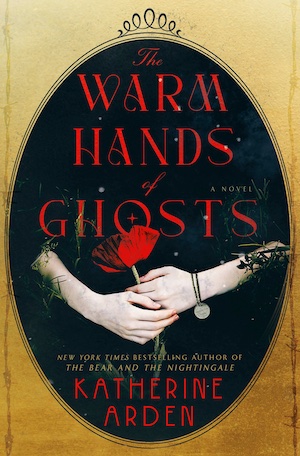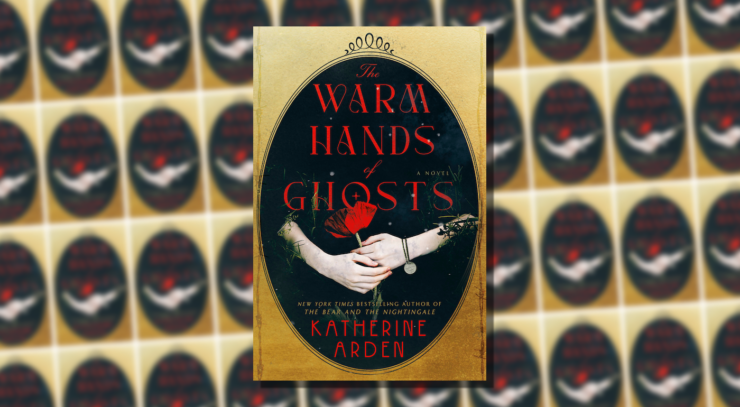The year is 1917, bleeding into 1918. The world is narrowed at Passchendaele to a bare few miles of trenches, of mud, of whistling shells and burning water, of dead and wounded men huddled in flooded craters. Anything beyond those narrow confines—childhood memories, family farms, angels and devils, poetry and art—is so far away as to be alien, so idyllic that it aches to remember. What wouldn’t a soldier of the First World War give up for a chance at a reprieve?
There are two stories taking place in Katherine Arden’s The Warm Hands of Ghosts, intricately and delicately woven together. Freddie Iven is one of those unfortunate soldiers, who wakes after an explosion trapped in an overturned pillbox with an injured German soldier named Winter. But neither of them want to kill the other, for the only thing worse than being trapped in the dark is being trapped in the dark alone. As their concrete coffin is battered apart by shells, they manage to dig their way out; yet the trenches they find are no freedom, and neither Freddie nor Winter want to return to their lines and abandon the other.
As they try to find a way to slip away from it all, they encounter a man calling himself Faland, who promises safe refuge, an escape from the horrors all around them and the memories plaguing them—but for a price.
Buy the Book


The Warm Hands Of Ghosts
Back in Halifax, Freddie’s sister Laura continues her work as a nurse even after being injured on the front lines and discharged from service. The Halifax Explosion—the detonation of the French cargo ship Mont-Blanc laden with high explosives in the harbor in December 1917—keeps her busy with patients and distracts her from the death of her parents. The news only gets worse when she receives word from Passchendaele of Freddie’s death and his meager belongings… but something’s wrong. She’s watched men die in hospital, watched what the generals send back to bereaved relatives, and what she finds among his effects isn’t like what she’s seen before.
Heedless of her limp (courtesy of a shell) and scarred hands (courtesy of poison gas and disease), she volunteers with Mary Borden, director of a private field hospital near the front, to find out what really happened to Freddie. But on her way there, she encounters a strange hotel filled with violin music so raw and emotional it could almost be composed of souls themselves. Its proprietor is a slick, once-beautiful man named Faland. The next morning, the hotel and Faland are gone, but she can’t shake what she saw there; she needs to find Freddie before he’s gone forever.
The Warm Hands of Ghosts is in many ways not just a historical fantasy, but a book about fantasy writ large. The Lord of the Rings, a book which redefined and likely built the genre as we understand it, was inspired by Tolkien’s own experiences in World War One, filtered into the visages of faraway landscapes and the words of invented languages so that he could find the words to describe it.
He defended fantasy in a university lecture in 1939, speaking to those who derided it as mere escapism with the famous quote, “Why should a man be scorned if, finding himself in prison, he tries to get out and go home? Or if, when he cannot do so, he thinks and talks about other topics than jailers and prison-walls? The world outside has not become less real because the prisoner cannot see it.” During that lecture, he also spoke of the ways in which fantasy served as a condemnation of industrial misery exemplified by WWI: “For it is after all possible for a rational man… to arrive at the condemnation, implicit at least in the mere silence of “escapist” literature, of progressive things like factories, or the machine-guns and bombs that appear to be their most natural and inevitable products.”
Arden cites Tolkien specifically in her endnotes, but the theme of fantasy being a salve, perhaps even necessary, during hellish times is present throughout the book. While Laura works as a nurse at the front lines, she hears the stories the men tell one another of “the fiddler”—her mysterious hotelier—who places cryptic advertisements in the satirical trench newspaper and can make the scenes of the war disappear, at least for a time. But those who find him once will never find him again and never stop pining to return. The surgeons and doctors dismiss the stories, say they’re agitating the men… but they can’t bring themselves to stop it being told, for those stories and that hope are all that are keeping some of their patients alive.
Laura is a nurse who, for much of the story, resists the ghosts swirling around her. She doesn’t want to believe in them, what Tolkien called in that same lecture “the oldest and deepest desire, the Great Escape: the Escape from Death.” But for Freddie, Arden masterfully turns this dynamic on its head. Entrapped by Faland, Freddie has fallen deep into this fantasy, into the gilded velvet walls, clean unsullied lamps, and nights free of the thudding of artillery—too deep, in fact. Though he wants nothing more than to forget the dead and endless futile charges that stripped his friends away from him, he also knows that to give up everything will be to lose himself as well.
The Warm Hands of Ghosts is everything I hoped it to be. It’s at once literary, as though it was actually written in 1917, and visceral, not shying away from the grim and bloody brutality of the trenches or the desperations of the hospitals. Nor are we mired in them—it’s a story of love and memory able to persist through the darkest of times, and The Warm Hands of Ghosts is a book which will similarly stick with you.
The Warm Hands Of Ghosts is published by Del Rey.










